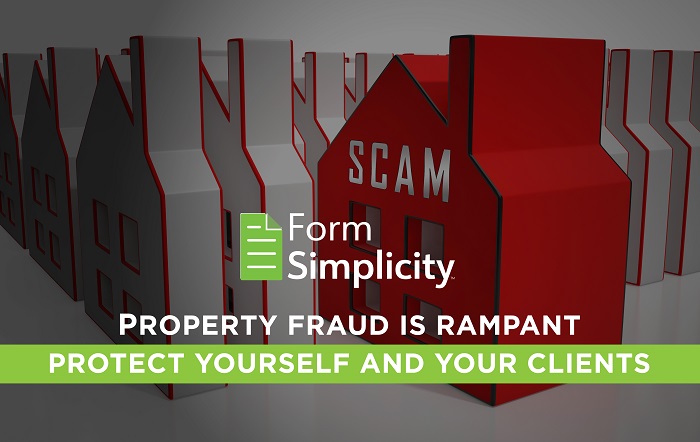
There are many types of fraud prevalent today in the real estate industry. Property fraud or “house stealing” is a white-collar crime that if left undetected can lead to a variety of issues. Property fraud can happen when a scammer files fake deeds and/or makes it appear as if it is their home when it is not theirs to sell. Along with deed forgery, identity theft and mortgage fraud are top in line for the hottest home crimes happening today.
Let’s look at what types of properties are at the highest risk.
House Flipping
The house flipping shows where celebrities purchase a distressed property, fix it up and flip it are widely successful. It is also a legitimate investment strategy.
Then there is the negative side of house flipping. Throughout the country, many homes are purchased as distressed properties, for cash, with little or no money used to fix it up. The house goes back on the market soon after purchase and is priced to sell quickly.
Many cities throughout the United States have a shortage of homes for sale, which makes this a prime market for scammers. The homes may have inflated appraisals. The home is then sold for a high value to an unsuspecting buyer.
Inflated prices were one of the biggest reasons for the housing crisis in 2008 where many people lost their homes. Realtors were not immune to this as well. To this day, many good people own homes that they paid for at inflated prices and have been unable to sell. Others lost their place to foreclosure.
You can help avoid this with your clients by having a qualified home inspector check out the property along with an appraisal as a contingency to the offer. In many cases, a cash offer is not subject to an appraisal. This could be a mistake.
Unoccupied, Abandoned, or Distressed homes
If you have one of these homes listed for sale or rental, make a habit of visiting them each week, or have the owner check the property regularly. When a home looks unoccupied, it can be an easy target for a con artist.
Example 1: One home located in a high-traffic area in Miami was unoccupied and had a For Sale Sign on the property. A man took out the A/C unit and entered the property from the back. He made it into his home and answered the door when buyers came to view the property. He dressed the part and said it was his place. The listing agent lived over an hour away and did not visit the property. This went on for some time with the buyers’ agents thinking he was the owner of the property. Eventually, he got caught, the police were called, and he was arrested. He belonged to a ring that occupied vacant homes.
Example 2: A home owned by a couple living outside the United States was left unoccupied a few months of the year. Scammers, posing as owners of the property, signed deeds transferring ownership into their names (or fake names). These types of illegal transactions often use quitclaim deeds and may not require a mortgage, so they are unlikely to involve title insurance.
Homes Owned By Divorced Or Deceased Relatives
As a real estate agent, when you take a listing, make sure you know who owns the home. I know it may sound crazy, yet when a home is the subject of a divorce or death, it can get quite tricky. Getting input from a real estate attorney can be informative and essential.
Example 3: Recently, one home was put up for sale and there were multiple problems once the offer was accepted. The daughter, who inherited the home, accepted money from a friend to pay monies owed on the property. She promised to pay him back when the home was sold. She did not realize that the document he asked her to sign put his name along with hers as the owner of the home. The friend then took a loan out of the property. Then Liens were placed on the home for non-payment of the loan and subsequently, the home went into foreclosure.
Thankfully, the listing agent recommended an attorney who saved her home from the auction. Then it was sold for a profit, and she was able to move on with her life.
In this case, the daughter did not understand the full implications of what the friend asked her to sign. You can help friends and clients avoid this dilemma by suggesting to them that they hire their own attorney, (not their friend’s) to draw up any documents related to a loan on the property. And to make sure they read and understand what they are signing.
Senior Citizens and Those Facing Foreclosures
Senior citizens are hugely affected by these crimes, and the perpetrators can be their own family or neighbors. This is why it is important to check in with those we care about and make sure that they have someone else (preferably a trusted family member) who is also on the paperwork.
Example 4: The son of a recently deceased neighbor called to find out the current value of the home he inherited along with his siblings. While he was staying there, he received a foreclosure notice in the mail.
In this case, one of his sisters had convinced their mother to re-finance the mortgage on the home. (The mom’s home had a lot of equity in it and her mortgage balance was low.) The sister then took the money from the refinance and purchased her own home.
The mom’s home then fell into arrears due to missed payments. The mom trusted her daughter and perhaps did not understand the full implications of the refinancing of her home. The house was set to go to auction in less than a week.
When the real estate agent researched the current value of the home, they realized there was no way the proceeds from the sale would pay off the new balance owed. The family that just lost their mother now had to vacate the home and could not save it from foreclosure.
Families can prevent this when more than one relative is keeping track of the parent’s documents. This can prevent one family member, in this case, the daughter, from putting her mom’s home in peril.
Many of us know from experience that aging parents do not like to admit that they are not at full mental or emotional capacity. That is where the love of a family member can help. It is an important conversation to be had and many times, not an easy one.
Use These 5 Simple Steps to Potentially Avoid Property Fraud
- Check your counties’ official records for any deeds, mortgages, or liens on the property and make sure they are accurate.
- When taking a listing, have a title company research the records to make sure there are no liens on the property and to make sure the home does belong to the person living in the home.
- If your property is unoccupied for any length of time, make sure the mail is not piling up, along with newspapers lying at the front door. Keep the landscaping trimmed so there are no obvious signs of neglect.
- Make sure the Property Appraiser and Tax Collector offices have the correct mailing address for you or the person who should receive notices about the property.
- Many counties are offering a free-fraud alert to notify owners when any deed or mortgage is recorded with their office. They can send text or e-mail alerts.
Once you are a victim, it may seem simple to just get your home back, yet the law does not currently work that fast. It takes hiring an attorney and a potentially lengthy legal process.
By educating yourself and your clients you can potentially avoid the distress of property fraud.
Written for Form Simplicity by Janice Zaltman, a Realtor, LEED AP, Marketing Coach and Writer with more than 20 years of experience in the sales, marketing and media fields.




